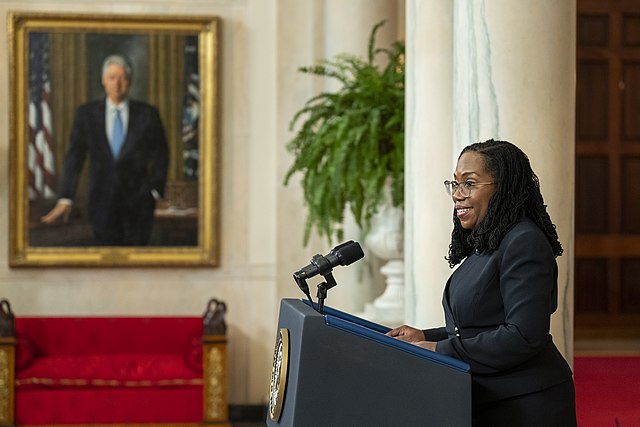Ketanji Brown Jackson and the Issue of Diversity in The Supreme Court
With the recent appointment of Ketanji Brown Jackson, the newest Supreme Court Justice, the debate on more diversity within the Supreme Court has begun anew.
Adam Schultz / The White House, Public domain, via Wikimedia Commons
Ketanji Brown Jackson proudly makes a speech at the White House.
In America, we have a precedent of equality and fair judgment; when a jury is called, they must be impartial and reflect the community in which the crime was committed. It would be unfair for a Black man in a Black neighborhood to be judged by only white men, for instance. In an ideal world, a jury would represent a diverse group of people in terms of age, gender, race, and sexuality, but we do not live in an ideal world.
Historically, the Supreme Court has been dominated by one group of people — old white men. The first Black Supreme Court justice was Thurgood Marshall, a brilliant judge who worked under John F. Kennedy and was later appointed as the United States Solicitor General. Marshall was appointed by Lyndon B. Johnson and was succeeded by Clarence Thomas, the second Black Supreme Court Justice. Ketanji Brown Jackson, the newest Supreme Court appointee, represents the first female Black justice to sit on the Supreme Court, and while this is an impressive feat, it took a depressingly long time.
The irony that, until 2009, there was only ever one person-of-color representative in the Supreme Court at a given time hopefully is not lost.
America is a bastion of diversity, yet it’s not represented in our government.
We have yet to have Asian-American, Native American, or Pacific Islander representation in the Supreme Court and have only recently had Hispanic representation with Justice Sonia Sotomayor. It’s unacceptable, especially when considering America’s longstanding history with Asian-American immigrants.
In February 1942, two months after the bombing of Pearl Harbor, Franklin D. Roosevelt signed an executive order to remove Japanese people living in the United States from their homes and place them in internment camps. A whole ethnic group was rounded up for simply being from a war-torn country that they had to flee. When Fred Korematsu, a Japanese-American, challenged the constitutionality of the camps asserting that it violated the Fifth Amendment and the Fourteenth Amendment, his case was brought to the Supreme Court.
Korematsu lost to a 6-3 decision. Justice Robert Jackson wrote in favor of Korematsu: “Korematsu… has been convicted of an act not commonly thought of as a crime. It consists merely of being present in the state whereof he is a citizen, near the place where he was born, and where all his life he has lived.” He concluded that the executive order was “the legalization of racism” and contended that America was “fall[ing] into the ugly abyss of racism.”
Every single justice on the Supreme Court in 1942 was a white man. Korematsu stood alone as one of the only people of color in the courthouse. It was decided that he would be sent into an internment camp for committing no crime except being Japanese.
On April 7th, 2022, Democrats had a major victory after President Biden appointed Ketanji Brown Jackson to the Supreme Court to replace Justice Stephen G. Breyer. In a narrow margin of 53-47, the Senate approved of her nomination. People of color around the world rejoiced as the United States entered a new era of representation and diversity in government positions.
Diversity is a necessity for a functional government. Including a diverse set of backgrounds, races and sexualities guarantee that there will be someone representing minority groups in Congress. Without it, we return to an era of Jim Crow.
Compared to other areas of government such as the Senate and House of Representatives, the Supreme Court has too few members for it to be representative of all backgrounds. Within the House of Representatives, only 28% of the members are considered minorities, with 84% of those members coming from the Democratic party.
Ketanji Brown Jackson is one of the most qualified members in the Supreme Court, not only because of her prestigious education but also because of her background as a public defender and district judge.
Jackson provides a needed voice in the Supreme Court that will not only speak up for civil rights but also women’s rights. After the untimely passing of Ruth Bader Ginsburg, a legendary advocate for women’s rights and progressive values, her spot was replaced by Amy Coney Barrett, who is quite possibly the most anti-women’s rights justice on the Supreme Court. Jackson brings this lost voice back into the Supreme Court.
On June 30th, 2022, Jackson was sworn into the Supreme Court and will begin hearing cases in the next term. One of her first major cases will be 303 Creative LLC v. Elenis in which a web designer is refusing to service LGBTQ people, which is restricted by the state’s anti-discrimination law.
We need increased diversity and more nominations such as Ketanji Brown Jackson’s.
Diversity is a necessity for a functional government. Including a diverse set of backgrounds, races and sexualities guarantee that there will be someone representing minority groups in Congress.
Sophie Livingstone is an Editor-in-Chief for ‘The Science Survey.’ She enjoys both journalistic and creative writing and the influence that one can...

